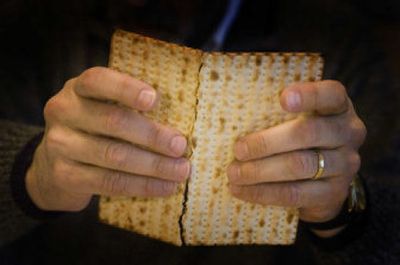Feast retells story of Jews’ exodus

To prepare for the Jewish Seder, Shonna Bartlett made “charoset” by mixing diced apples, crushed walnuts, raisins and a splash of Manischewitz red wine.
She cut parsley and celery, arranging them on a large plate along with other symbolic foods – horseradish to represent the bitter life of the Israelites when they were slaves in Egypt; the charoset for the mortar they used for building; a bowl of salt water to signify their tears.
Bartlett isn’t Jewish, but the Spokane resident still finds meaning in the Passover feast.
“The Seder is probably the most beautiful religious ritual I’ve ever been part of,” said Bartlett, a Roman Catholic. “I prepare for it in the same way that I prepare for all rituals – by being open to the wisdom, the beauty, the humor … to however God will work in that time and space.”
Passover, or Pesach – the most commonly observed Jewish holiday – begins Wednesday at sundown. As Jewish families throughout the world gather to share foods and prayers about the exodus from Egypt, many Christians and non-Jews also will honor that history by taking part in the sacred feast.
Earlier this week, Bartlett and other non-Jews – including two priests, a nun and others involved in Christian ministry – learned more about the Seder by breaking matzo, drinking kosher wine and sharing a “model Seder” with members of Ner Tamid, a Reform Jewish congregation in Spokane. The gathering took place in the dining room of the Ministry Institute at Mater Dei, a center for educators, clergy and lay spiritual leaders from all over the world.
“This is the retelling of the story, the important story of the Jewish people,” said Ner Tamid’s Gary Singer, sitting at a table below a painting of Jesus and the Last Supper. “This is the story of enslavement and redemption … a story that other cultures have made their own.”
Passover is uniquely Jewish, but the Israelites’ struggle for freedom has universal meaning.
Many in the room pointed to Christianity’s roots in Judaism and the importance of understanding that connection. “It’s part of our history,” said Danae Ashley, who is studying to become a priest in the Episcopal Church. “Christians can learn so much from the Seder, and the diligence and intentionality of Jewish traditions.
“The more we know about other faith traditions, the better we can minister our own,” she said.
The Rev. Niyitegeka Cyprien, a Catholic priest from Rwanda, compared the exodus story to Jesus’ sacrifice on the cross. “This Jewish feast is part of our liturgy,” he said. “We come from the slavery of sin, but Jesus Christ delivered us. Now, we are free.”
Several people who attended the Seder had attended other Passover meals in the past, but those feasts were usually “Christianized” with a communion or washing of the feet, which Jesus performed during the last meal he shared with his disciples.
Wednesday evening’s meal, however, focused on the Jewish traditions.
For more than two hours, the 15 participants sat at tables with Seder trays, drinking wine and eating the ritual Passover foods. Every edible item had meaning – from the four glasses of wine or grape juice, which stood for God’s promise to the Jews while they were in captivity, to the thin, crisp matzo, which represented the unleavened bread the Israelites brought with them when they fled Egypt.
As he led the meal, Singer took an alternative approach to the traditional Seder by telling jokes and using his family’s “cut-and-paste” Haggadah – the guidebook made up of traditional prayers, commentaries, songs and other readings.
Singer’s Haggadah included a humorous play – a spoof on the exodus story – as well as narrative songs with titles such as “He Freed Us,” sung to the tune of the Beatles’ “She Loves You” and “Leaving on a Desert Plane,” based on Peter, Paul and Mary’s “Leaving on a Jet Plane.”
Laughter and jokes filled the dining room during parts of the meal, but the gathering also included many solemn moments punctuated by prayer in both Hebrew and English.
“Baruch Atah Adonai, ga’al Yisrael,” Singer said while lifting a glass of wine. “We praise you, Adonai our God, who has freed the people of Israel.”
As he shared the history of his people, he later reminded others in the room that slavery, oppression and injustice still exist.
“The Seder is a way for me to bond with both the past and the present,” said Singer, who has shared the ritual with many non-Jews and various Christian congregations in the area including Manito United Methodist Church and St. Ann’s Catholic Church. “Because we are a minority faith, I look upon it as a way to educate.”
Wednesday night’s Seder at the Ministry Institute helped students and staff learn more about the Jewish tradition while deepening their own faith, said Bartlett, the institute’s program director. The Passover feast “is such a hopeful ceremony,” she said.
“No matter what we’re going through, no matter where we are in that exodus story, we know that God is with us and will always be with us, wherever we are called to journey.”